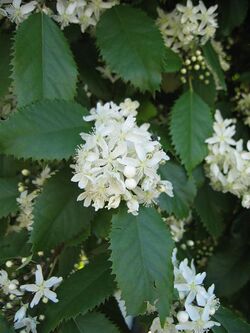Biology:Hoheria populnea
| Hoheria populnea | |
|---|---|

| |
| Scientific classification | |
| Kingdom: | Plantae |
| Clade: | Tracheophytes |
| Clade: | Angiosperms |
| Clade: | Eudicots |
| Clade: | Rosids |
| Order: | Malvales |
| Family: | Malvaceae |
| Genus: | Hoheria |
| Species: | H. populnea
|
| Binomial name | |
| Hoheria populnea A.Cunn.
| |
Hoheria populnea, commonly known as New Zealand mallow,[1] lacebark or houhere, is a species of flowering plant in the family Malvaceae, endemic to New Zealand.
Hoheria populnea is found from the coast to lowland forests, and has a natural distribution from the North Cape of the North Island, to the Bay of Plenty.[2] It can grow into a tree 12 metres tall and has broad, oval leaves, with serrated margins.[3] The leaves are dark green, 5–12 cm long and 6 cm wide.[4] Lacebark produces white flowers in clusters from January to March.[5]
The bark of the plant was used in Māori traditional textiles to create ropes, hats, kits and headbands.[6] Oral histories tell of early experiments to create felted material from the plant, similar to aute (the paper mulberry used in Polynesian textiles), however attempts were unsuccessful.[6]
References
- ↑ (xls) BSBI List 2007, Botanical Society of Britain and Ireland, https://bsbi.org/download/3542/, retrieved 2014-10-17
- ↑ Malloy, Les (1982). The Ancient Islands. Wellington: Port Nicholson Press. pp. 59. ISBN 0908635044. https://archive.org/details/ancientislandsne0000enti/page/59.
- ↑ "Flowering seed plants: North and South Islands – Houhere, lacebark". The University of Auckland. http://web.auckland.ac.nz/uoa/science/about/departments/sbs/newzealandplants/seed-plants-flowering/find-by-north-&-south-islands/malvaceae-4-hoheria-populnea.cfm.
- ↑ "Lacebark, Ribbonwood Hoheria populnea (A.Cunn)". Herb Federation of New Zealand. http://www.herbs.org.nz/haw/hoheria.pdf.
- ↑ "Hoheria populnea" (in en). https://www.nzpcn.org.nz/flora/species/hoheria-populnea/.
- ↑ 6.0 6.1 Neich, Roger (1996). "New Zealand Maori Barkcloth and Barkcloth Beaters". Records of the Auckland Institute and Museum 33: 111–158. ISSN 0067-0464.
Wikidata ☰ Q1623958 entry
 |

